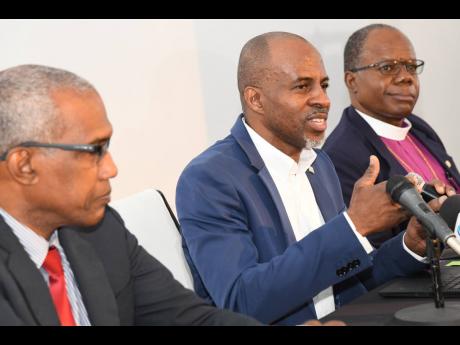Editorial | Re-energising CMOC
The Gleaner welcomes the announcement that not only have private sector and civil society groups recommitted themselves to an updated national consensus on crime, but that more of them have joined the initiative.
But given that the NGOs can achieve little to nothing by themselves, we support their encouragement of the government and the Opposition to display their support for the project, with “a symbolic signing of … an updated consensus”. However, the political players must have real ownership of the agreement, rather initialling it merely to assuage the other partners. The background preparations have to be done.
But not only must the civil society groups ensure that the politicians are, or remain, on board with the reset, they have to do a better job, as is implicitly promised in their statement, at bringing Jamaicans into an open and honest conversation about the programme.
Put another way, all the stakeholders, including the public, must have clarity on what they have committed themselves to, and why. There must be no basis for obfuscation or shifting of goalposts if, or when, obligations aren’t met.
APPROPRIATELY EXPLAINED
If timelines aren’t achieved, or people change their minds about undertakings, this should be frankly declared and appropriately explained. This approach to a reformed consensus agreement is important, especially as Jamaica’s political parties gear up for general elections due next year. Crime is likely to command major attention in the campaign.
Of course, while there can be, and are, legitimate policy differences on these questions, the island’s longstanding crisis of criminal violence, and its high homicide rate, shouldn’t be a cudgel whose wielding poses a threat to social stability. Some issues should be placed beyond hyper partisanship.
Initially signed in 2020 between the government, the opposition People’s National Party (PNP) and civil society organisations, National Consensus on Crime outlined policy actions to be undertaken by the administration – with the implicit support of the other partners – to strengthen the capacity of the State to address crime generally, but more so criminal violence and corruption. Each deliverable had a timeline for its achievement, which, if they had been kept, would have meant the completion of the whole list two years ago.
The performance, though, has been mixed. At the start of this year, the Consensus Oversight and Monitoring Committee (CMOC), which polices the project, reported that around half of the initiatives had been completed, with several others at various stages of implementation. Some, though, including critical ones, were untouched.
What has been more concerning for this newspaper, however, is that despite the government regularly touting its achievements (particularly about the technologically kitting out of the police force) on the anti-crime front, it appears to have been less than fully embracing of the CMOC.
BROKEN TRUST
Additionally trust, on most things, but especially on crime, is clearly broken between the government and the Opposition. They have disagreed particularly on the administration’s use of states of public emergency as a crime-fighting instrument (the constitutionality of which the PNP challenged in court) and whether the Opposition, in so doing, reneged on implicit undertaking on the consensus document.
Notwithstanding these issues, The Gleaner retains its support for CMOC, both as a concept and its achievements in trying circumstances. It makes sense that the government and Opposition, differences notwithstanding, should, too.
While CMOC can do more in engaging Jamaicans on its work, and the specifics of the initiatives it monitors, it is possible that without its efforts the Government might not have agreed to some of the initiatives, and would perhaps have been less focused on their implementation.
Moreover, the evidence shows that in Jamaica where trust in institutions is low, the best outcomes tend to be achieved when consensus forged between stakeholders are policed by credible honest brokers. That was the case with the Economic Programme Oversight Committee (EPOC), whose surveillance of Jamaica’s macroeconomic performance when the country had loan agreements with the International Monetary Fund helped to keep the government on a path of fiscal discipline. That was a significant contributor to the stability in the economy. EPOC has proved a useful model in other areas of national life.
Personalities, of course, can make a difference in initiatives like CMOC. In that respect, this newspaper interpreted as potentially positive development Prime Minister Andrew Holness’ appointment of Dana Morris Dixon, a minister in his office, as the government’s interlocutor with CMOC. That, however, is on the supposition that Dr Morris Dixon engages CMOC on the basis of real authority, and not merely having the seat because Dr Chang isn’t inclined to be there.
Similarly, we expect the Opposition to bring seriousness and commitment to its participation in CMOC.

